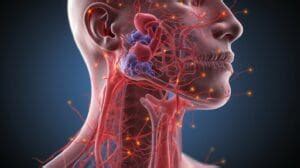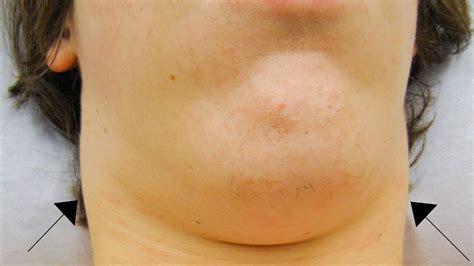Intro
Understand under jaw lymph nodes, their role, symptoms, and treatment. Learn about swollen lymph nodes, lymphoma, and cancer signs, and discover how to check and care for these vital immune system helpers.
The human body is composed of a complex network of systems, each playing a vital role in maintaining overall health and functionality. One such system is the lymphatic system, which is responsible for protecting the body against infections and diseases. A key component of this system is the lymph nodes, small, bean-shaped structures that are located throughout the body. Among these, the under jaw lymph nodes are of particular interest, as they are often one of the first lines of defense against pathogens that enter the body through the mouth, nose, and throat.
Lymph nodes act as filters, trapping and breaking down harmful substances, such as bacteria, viruses, and other foreign particles. They contain immune cells called lymphocytes, which recognize and attack these invaders, helping to prevent infection and disease. The under jaw lymph nodes, specifically, are located in the neck, under the jawbone, and play a crucial role in draining lymph fluid from the face, neck, and scalp. This strategic location allows them to intercept and eliminate pathogens before they can spread to other parts of the body.
Understanding the function and importance of under jaw lymph nodes is essential for maintaining good health. When these nodes become swollen or enlarged, it can be a sign of an underlying infection or disease. Swollen lymph nodes under the jaw can be caused by a range of conditions, from common colds and sinus infections to more serious diseases like tuberculosis or cancer. Recognizing the signs and symptoms of swollen lymph nodes and seeking medical attention if necessary can help prevent the spread of infection and ensure prompt treatment.
Functions of Under Jaw Lymph Nodes

The primary function of under jaw lymph nodes is to act as a defense mechanism against pathogens. They filter lymph fluid, removing harmful substances and housing immune cells that recognize and attack invaders. This process helps to prevent the spread of infection and disease, protecting the body's overall health. Additionally, under jaw lymph nodes play a role in the immune system's response to cancer, as they can trap and break down cancer cells, helping to prevent the spread of the disease.
Immune Response and Under Jaw Lymph Nodes
The immune response is a complex process that involves the activation of immune cells, such as lymphocytes, in response to the presence of pathogens. Under jaw lymph nodes are a key site for the activation of these cells, as they provide a location for immune cells to recognize and interact with foreign substances. This interaction triggers an immune response, which helps to eliminate the pathogen and prevent infection.Causes of Swollen Under Jaw Lymph Nodes

Swollen under jaw lymph nodes can be caused by a range of conditions, from common infections to more serious diseases. Some of the most common causes of swollen lymph nodes under the jaw include:
- Common colds and flu
- Sinus infections
- Tooth infections
- Skin infections, such as acne or cellulitis
- Tuberculosis
- Cancer, such as lymphoma or leukemia It is essential to seek medical attention if swollen lymph nodes persist or are accompanied by other symptoms, such as fever, fatigue, or weight loss.
Symptoms of Swollen Under Jaw Lymph Nodes
The symptoms of swollen under jaw lymph nodes can vary depending on the underlying cause. Common symptoms include: * Swelling or enlargement of the lymph nodes under the jaw * Pain or tenderness in the affected area * Fever * Fatigue * Weight loss * Sore throat * Difficulty swallowing If you are experiencing any of these symptoms, it is crucial to seek medical attention to determine the underlying cause and receive proper treatment.Treatment for Swollen Under Jaw Lymph Nodes

The treatment for swollen under jaw lymph nodes depends on the underlying cause. In some cases, swollen lymph nodes may resolve on their own without treatment. However, if the swelling persists or is accompanied by other symptoms, medical attention is necessary. Treatment may include:
- Antibiotics to treat bacterial infections
- Antiviral medications to treat viral infections
- Pain relief medications to manage discomfort
- Surgery to remove infected tissue or cancerous cells
- Radiation therapy or chemotherapy to treat cancer
Home Remedies for Swollen Under Jaw Lymph Nodes
While medical attention is necessary to determine the underlying cause of swollen under jaw lymph nodes, there are some home remedies that can help alleviate symptoms. These include: * Applying a warm compress to the affected area to reduce swelling and pain * Taking over-the-counter pain relief medications, such as acetaminophen or ibuprofen * Resting and avoiding strenuous activities to help the body recover * Staying hydrated by drinking plenty of fluids * Practicing good hygiene, such as washing your hands regularly, to prevent the spread of infectionPrevention of Swollen Under Jaw Lymph Nodes

Preventing swollen under jaw lymph nodes involves maintaining good health and hygiene practices. Some ways to prevent swollen lymph nodes include:
- Practicing good oral hygiene, such as brushing and flossing your teeth regularly
- Avoiding close contact with people who are sick
- Getting vaccinated against common infections, such as the flu
- Eating a healthy diet rich in fruits, vegetables, and whole grains
- Staying hydrated by drinking plenty of fluids
- Managing stress through relaxation techniques, such as meditation or deep breathing
Importance of Regular Check-Ups
Regular check-ups with your healthcare provider are essential for maintaining good health and detecting any potential issues early. During a check-up, your healthcare provider can examine your lymph nodes, including those under your jaw, to check for any abnormalities. If you are experiencing any symptoms or have concerns about your lymph nodes, it is crucial to discuss them with your healthcare provider.What are the common causes of swollen under jaw lymph nodes?
+Common causes of swollen under jaw lymph nodes include infections, such as the common cold or sinus infections, as well as more serious diseases like tuberculosis or cancer.
How can I prevent swollen under jaw lymph nodes?
+Preventing swollen under jaw lymph nodes involves maintaining good health and hygiene practices, such as practicing good oral hygiene, avoiding close contact with people who are sick, and getting vaccinated against common infections.
What are the symptoms of swollen under jaw lymph nodes?
+Symptoms of swollen under jaw lymph nodes can include swelling or enlargement of the lymph nodes, pain or tenderness in the affected area, fever, fatigue, and weight loss.
In conclusion, understanding the importance and function of under jaw lymph nodes is essential for maintaining good health. By recognizing the signs and symptoms of swollen lymph nodes and seeking medical attention if necessary, you can help prevent the spread of infection and ensure prompt treatment. Remember to practice good hygiene and health habits, such as regular check-ups with your healthcare provider, to stay healthy and detect any potential issues early. If you have any questions or concerns about under jaw lymph nodes or are experiencing symptoms, do not hesitate to reach out to your healthcare provider. Share this article with others to help spread awareness about the importance of under jaw lymph nodes and encourage them to prioritize their health.
